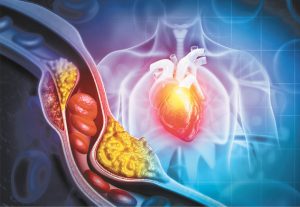By Kathy V. Verdes, APRN, A-GNP-C


The Balancing Act: Cholesterol Basics
Cholesterol is a waxy substance found in the cells of our body and is vital for building cell membranes, producing hormones, and aiding digestion. It travels through the bloodstream, packaged within lipoproteins. LDL cholesterol is known as “bad” because when levels become excessive, it can accumulate in artery walls, leading to atherosclerosis and increasing the risk of heart disease. On the other hand, HDL cholesterol is referred to as “good” because it helps remove excess cholesterol from the bloodstream and transport it to the liver for disposal.
Guarding Against Heart Disease
The significance of good cholesterol becomes evident when considering its protective effects against heart disease. HDL cholesterol acts as a scavenger, picking up excess cholesterol from artery walls and delivering it to the liver for excretion. This process prevents the buildup of plaques that can narrow and harden arteries, reducing the risk of heart attacks and strokes. Maintaining healthy levels of HDL cholesterol is thus a fundamental step in safeguarding cardiovascular health.
Promoting Arterial Health
Good cholesterol doesn’t just clear away excess cholesterol; it also exhibits anti-inflammatory properties that contribute to arterial health. Inflammation within blood vessel walls is a key factor in the development of atherosclerosis. HDL cholesterol counteracts this by reducing inflammation and oxidative stress, fostering an environment that discourages plaque formation. By doing so, it helps maintain the elasticity and integrity of blood vessels, promoting efficient blood flow and lowering the risk of hypertension.
The HDL-Lifestyle Connection
While genetics do play a role in determining HDL levels, lifestyle choices have a substantial impact. Engaging in regular physical activity, maintaining a healthy weight, and avoiding smoking can all raise HDL cholesterol levels. Exercise in particular has been shown to increase the production of HDL cholesterol, enhancing its beneficial effects on heart health.
Dietary Considerations
Diet plays a significant role in influencing cholesterol levels, and certain foods can actively contribute to increasing HDL cholesterol. Consuming healthy fats, such as those found in olive oil, nuts, and fatty fish, can boost HDL levels. Additionally, incorporating sources of soluble fiber, like oats, beans, and fruits, can help enhance HDL function. Moderating the intake of saturated and trans fats is equally crucial for maintaining a healthy balance between good and bad cholesterol.
Beyond Cardiovascular Health
The influence of good cholesterol extends beyond cardiovascular health. Emerging research suggests that HDL cholesterol may play a role in various other aspects of well-being. For instance, HDL has been associated with improved cognitive function and a reduced risk of neurodegenerative diseases. Furthermore, it has been found to have antioxidant properties that could contribute to overall immune system support.
Strategies for Raising HDL Cholesterol
For individuals with low HDL cholesterol levels, several strategies can help raise these levels and maximize their benefits. Alongside adopting a heart-healthy diet and engaging in regular exercise, limiting alcohol intake and managing stress can also contribute to increasing HDL cholesterol levels.
While much attention has been given to the dangers of bad cholesterol, it’s essential not to underestimate the vital role of good cholesterol in maintaining optimal health. HDL cholesterol acts as a shield against heart disease, promoting arterial health and offering protection against inflammation. Embracing a lifestyle that supports healthy HDL levels through physical activity, a balanced diet, and other positive choices can contribute to a longer, healthier life. By recognizing the importance of good cholesterol, we empower ourselves to make informed decisions that nurture our cardiovascular and overall well-being.
KATHY VERDES APRN, A-GNP- C
Kathy earned her Master’s in Nursing Degree from Kaplan University in 2017. Kathy is certified by the American Academy of Nurse Practitioners (AANP) as an Adult- Gerontology Primary Care Nurse Practitioner (A-GNP-C). Prior to her Advanced Practice Registered Nurse Degree (APRN), Kathy managed a weight loss clinic for over 6 years right here in Naples. Kathy has since then managed acute and chronic care illnesses in different settings, and she genuinely enjoys spending time with her patients.
Are you ready for a consultation?
Your treatment will be performed by a Certified Nurse Practitioner. Schedule your appointment now!
Naples Clinic
7385 Radio Road; Ste., 104, Naples FL 34104
(239) 384-9392
www.Naples-Clinic.com
 Southwest Florida's Health and Wellness Magazine Health and Wellness Articles
Southwest Florida's Health and Wellness Magazine Health and Wellness Articles

